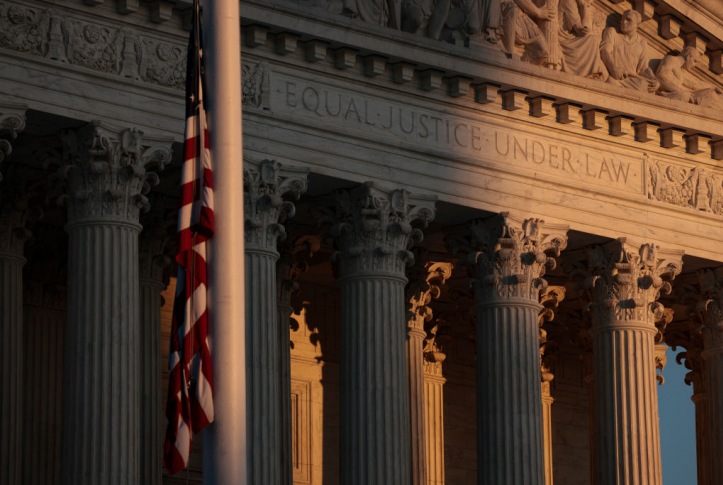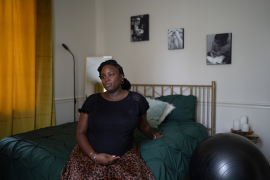The litigation around an unprecedented Texas law, Senate Bill 8 (S.B. 8), continues. Despite well-established Supreme Court precedent that prohibits states from banning abortions before fetal viability, S.B. 8 prohibits an abortion if a “fetal heartbeat” is present, at about six weeks. The law is not enforced by the state, but rather allows anyone to sue an individual who performs or knowingly “aids and abets” an abortion (e.g., medical providers, family members, friends) after a so-called heartbeat is detected. There are severe consequences: an injunction, a minimum of $10,000 in damages, and attorney’s fees. The law has had a chilling effect, effectively shutting down all abortions in Texas after six weeks of pregnancy.
States have long adopted unconstitutional laws, usually invalidated in federal court, to try to block abortion access. To avoid this fate, Texas relies on vigilante justice — unlimited enforcement by private individuals — to avoid the involvement of state officials. S.B. 8 has been challenged in several lawsuits but remains in effect. In this blog post, we review the status of litigation on S.B. 8.
Supreme Court Agrees to Consider Two Challenges
On October 22, the Supreme Court agreed to review two challenges against S.B. 8 — one brought by Whole Woman’s Health and Family Center and one by the United States Department of Justice (DOJ). The cases will be argued on November 1. A decision could be issued at any time after that.
Whole Woman’s Health v. Jackson
Whole Woman’s Health and other abortion providers and advocates challenged S.B. 8 in July. The Fifth Circuit Court of Appeals stopped the district court from proceeding and refused to block the law from going into effect while it heard the appeal. In early September, the Supreme Court refused to temporarily block the law; four justices (including Chief Justice John Roberts) dissented from this decision.
The Fifth Circuit scheduled a hearing on the case in early December. But the plaintiffs again requested Supreme Court review. This time, the request was granted, but the Supreme Court will only consider S.B. 8’s enforcement scheme and “whether a state can insulate from federal court review a law that prohibits the exercise of a constitutional right by delegating to the general public the authority to enforce that prohibition through civil actions” and will not review the constitutionality of Roe v. Wade in this case.
United States v. Texas
The Supreme Court also agreed to hear an appeal of a challenge to S.B. 8 filed by the DOJ on September 9. The DOJ had asked a federal district court to declare the law unconstitutional and enjoin Texas officials and private parties (as agents of the state) from implementing or enforcing it. Texas moved to dismiss the case, as did a group of antiabortion advocates who intervened in support of Texas. On October 6, Judge Robert Pitman sided with the DOJ and issued a preliminary injunction.
Judge Pitman, the district court judge, agreed that S.B. 8’s six-week abortion ban was clearly unconstitutional under current Supreme Court precedent. The opinion cited affidavit evidence establishing that even if people realize they are pregnant within six weeks, there are other legal and practical barriers (imposed by the state) that make it difficult to get an abortion within that time. Traveling to other states is not reasonable or affordable for many, and abortion providers in adjoining states are overloaded already. Judge Pitman further agreed that S.B. 8 interfered with the operation of federal programs like Medicaid, and that the United States has an obligation to protect the welfare of citizens whose constitutional rights are violated.
Judge Pitman’s order prevented the state and state officials (including judges and clerks) from enforcing S.B. 8. He thus blocked the operation of S.B. 8 until a trial on the merits of the lawsuit.
Texas and the antiabortion advocates appealed immediately to the Fifth Circuit, which blocked Judge Pitman’s order and left S.B. 8 in effect pending a December hearing. The DOJ asked the Supreme Court to reinstate the injunction and hear the case as soon as possible.
On October 22, the Supreme Court agreed to consider whether the United States can sue Texas, “state court judges, state court clerks, other state officials, or all private parties to prohibit S.B. 8 from being enforced.”
Other Litigation
In the meantime, other lawsuits continue in state and federal court. At least 14 cases have been filed in Texas state courts in Travis County (Austin) by abortion supporters with a goal of preventing right-to-life groups and individuals from suing under S.B. 8 and obtaining a judgment that finds S.B. 8 in violation of the Constitution. Several courts entered temporary restraining orders against potential plaintiffs but Texas Right to Life succeeded in getting a Multidistrict Litigation Panel (i.e., a panel responsible for hearing multiple cases on the same issue) to consolidate the cases before a single judge and block further litigation in the courts that had entered the restraining orders.
Other lawsuits were filed against Texas doctor Alan Braid, who wrote an op-ed in the Washington Post confirming that he performed an abortion in violation of S.B. 8. Residents of Illinois and Arkansas and the Texas Heartbeat Project filed state court lawsuits against Dr. Braid. He filed an interpleader action in federal court in Illinois to ask the court to determine who gets the $10,000 (since S.B. 8 allows only one award per abortion) but also to declare the law unconstitutional.
Looking Ahead
For now, S.B. 8 remains in effect, and abortion access remains extremely limited in Texas — especially for low-income women and women of color. People who are sued under S.B. 8 — that is, providers or anyone who helps a person seeking an abortion — can defend themselves in Texas courts but will incur a significant risk of paying damages plus attorney’s fees.
All eyes are now on the Supreme Court, which is scheduled to hear Whole Woman’s Health and the DOJ challenge on November 1. Given the questions the Court has agreed to hear, these lawsuits will likely be resolved on procedural grounds — that is, whether S.B. 8’s unusual enforcement scheme insulates it from preenforcement challenges — rather than on the abortion restrictions themselves.
More is coming. In December, the Supreme Court will hear a separate challenge (Dobbs v. Jackson Women’s Health Organization) to a Mississippi law which, like S.B. 8, contravenes existing Supreme Court precedent and would ban nearly all abortion after 15 weeks.






